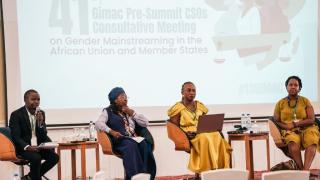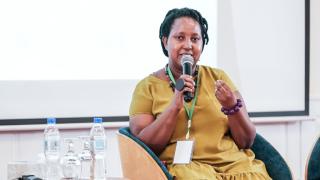REPARATIONS AND THE WOMEN, PEACE AND SECURITY AGENDA: WHERE ARE WE NOW, WHERE DO WE WANT TO GO?
Reperations and the Women, Peace and Security Agenda
Where are we now, where do we want to go?
Last month, as Global Policy and Advocacy Manager, I represented Women for Women International at the 41st Gender is my Agenda Campaign (GIMAC) Pre-Summit Civil Society Organisations (CSOs) Consultative Meeting in Addis Ababa, Ethiopia.
GIMAC is a network comprising about 55 national and international organisations, aiming to create a space for civil society to monitor the implementation of the Solemn Declaration on Gender Equality in Africa (SDGEA), mainly by holding bi-annual Pre-Summit Consultative Meetings to the African Union Assembly of Heads of State and Government. The theme of the meeting in Addis Ababa was “Advancing the Agenda for Justice and Reparations for African Women and Girls,” which is in alignment with the African Union’s theme of the year for 2025, "Justice for Africans and People of African Descent Through Reparations.”
As outlined by the African Union in its introduction to the theme on reparations, “In the continuing pursuit of justice and equity, the conversation about reparations has emerged as a critical and transformative dialogue that requires the collective attention and action of Africans and all people of African descent. The scope of this conversation goes beyond historical injustices and into the current fabric of societies around the world.” Reparations has long been a call among African people considering the historical injustices and crimes that have been committed against them such as slavery, colonialism, apartheid, genocide, and systemic discrimination. These have had significant effects on gender equality.
Today, various injustices and crimes are still being committed against Africans and people of African descent such as human rights abuses during times of conflict and crisis and climate change, which is exacerbating vulnerabilities among populations that are contributing the least to the phenomenon.
What are ‘reparations’?
Reparatory justice entails a range of initiatives that are designed to address these historical, and even current, injustices such as historical acknowledgment, financial reparations, land restitution, cultural preservation, policy reforms, international accountability, community empowerment, and continued advocacy. The Accra Proclamation on Reparations, following the Accra Conference on Reparations held in November 2023, reaffirmed that reparations are not solely about financial compensation but also about acknowledging past wrongs, promoting healing, and creating sustainable pathways for empowerment and development. Reparations are a matter of historical accountability and a critical component of contemporary human rights advocacy. They represent a step towards addressing the systemic inequalities that have marginalised Africans and people of African descent for centuries.

Reparations and women
Women and girls of African descent, both on the continent and in the diaspora, have been disproportionately affected by the legacies of slavery, colonialism, and systemic discrimination. The impact of these injustices has been compounded by gender-based violence, economic disenfranchisement, and limited access to resources and opportunities, which have been perpetuated against women throughout history.
Reparations are intrinsically linked to women's rights. The effects of historical injustices are not gender neutral. Women suffered unique harms, such as sexual violence, forced labour, economic disenfranchisement, and exclusion from decision-making processes. We still see the consequences of these wrongs rippling through societies even today, with ongoing wars and conflicts becoming more protracted, more complex, and more deadly.
How then does reparations link to the wider Women, Peace and Security (WPS) agenda?
The link may not be initially obvious, but one agenda cannot be fulfilled without the other and this was a key message that I communicated during a panel session I presented at on “Peace, Security, and Reparative Justice: Addressing the colonial legacy and its gendered impact”.
Last year, Women for Women International undertook and launched its most ambitious consultation project to date, ‘From Asking to Action’, and its findings and recommendations formed the basis of my presentation during the GIMAC session. Engaging over 6,500 women across 14 countries, the consultation project was designed on the pillars of the WPS agenda: protection, prevention, participation, and relief and recovery.
The three most common problems faced by women affected by conflict that we spoke with were:
-
Loss of property and livelihoods (reported by 72% of women)
-
Separation from family members (67%); and
-
Physical violence and abuse (67%).
These common problems of today are rooted in long histories of the colonial period, the struggle for independence, and various conflicts and crises that erupted across the continent following independence. 96% of the women we consulted with continue to face some form of violence, with 71% reporting intimate partner violence (IPV) as the most common. 89% said that restrictive norms limit their opportunities to engage in efforts advocating for ending violence against women and girls (VAWG). But despite the hardship and difficulties stacked against the women we engaged, 81% are hopeful and expectant that their circumstances will improve in the next five years.

With past wrongs not being acknowledged or rectified, and present wrongs being perpetuated, how should reparations be actualised within the framework of the WPS agenda?
-
Participation is a fundamental right for women and should be protected and promoted as much and as far as possible. Programmes that address the barriers to women’s participation should be funded, while existing platforms and safe spaces for women’s participation should be supported. 56% of women we consulted with reported that either they or someone they knew had participated in efforts to prevent VAWG. The onus is then on decision makers to regularly and meaningfully consult women. The movement for reparations should provide an opportunity to promote women's leadership in advocacy and decision-making processes. Including women in leadership roles within the reparations dialogue ensures that their voices and experiences shape the strategies and frameworks for reparative justice.
-
Protection of women’s rights should be strengthened with public awareness and education. Legal frameworks, institutions and enforcement mechanisms should be strengthened. The adoption of the African Union Convention on Ending Violence Against Women and Girls is a welcome step in the right direction towards holding Member States to account for their efforts in combatting VAWG.
-
Prevention is always better (and cheaper!) than cure. Implementing approaches that address the root causes of gender inequality for conflict prevention means investment in economic and social structures to enable women to enjoy and safely access their rights. Women we consulted with overwhelmingly called for increased investment in economic development programmes and improved education and job opportunities. Ensuring that women are economically and socially empowered will result in healthier and more prosperous societies.
-
Relief and Recovery are perhaps most important and key for rebuilding and repairing societies, which is at the heart of reparations. Trauma counselling and psychosocial support is crucial in ensuring healing and restoration for women looking to rebuild their lives after conflict. Involving women in the design and delivery of relief and recovery aid and programmes is also important in ensuring that programmes and aid are targeted and address the real needs of women. Reparations should include measures specifically targeted at addressing gendered and systemic harms, with women bearing a disproportionate burden and impact of violations and abuses.
As Africans and people of African descent continue to advocate for effective reparations and restitution for past and present wrongs, Women for Women International will continue to advocate for the full realisation of women’s rights in conflict and crisis contexts, and support the WPS agenda in securing a safe, prosperous and impactful future for women around the world.
